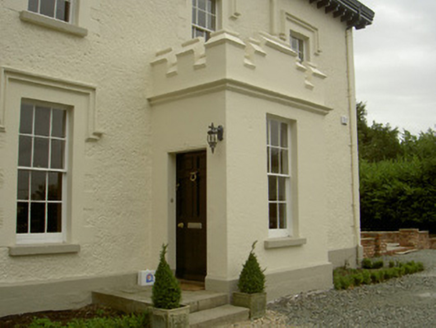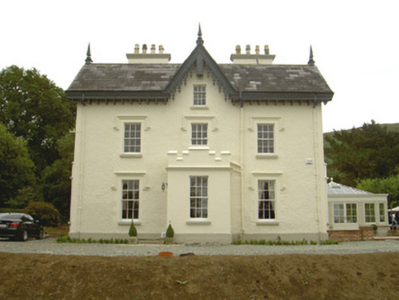Survey Data
Reg No
13900429
Rating
Regional
Categories of Special Interest
Architectural, Artistic, Historical, Social
Previous Name
Caraban
Original Use
House
In Use As
House
Date
1840 - 1850
Coordinates
308969, 312998
Date Recorded
02/08/2005
Date Updated
--/--/--
Description
Detached three-bay two-storey with attic house, built c. 1845. Half-dormer to west, crenellated entrance porch to west, canted bay windows to north and south, extension to east, c. 2005. Pitched slate roof, clay ridge tiles, smooth rendered chimneystacks with stepped caps and clay pots, overhanging eaves supported by painted timber brackets, decorative bargeboards, large painted timber finials and pendants to north and south gables and central half-dormer; moulded cast-iron gutters resting on bargeboards, circular cast-iron downpipes. Painted roughcast rendered walling, smooth rendered plinth, block-and-start quoins and entrance porch, random rubble stone walling to extension. Square-headed window openings, painted stone sills, smooth rendered surrounds, hood-mouldings with label stops, painted timber six-over-six sliding sash windows, three-over-six sliding sash to half-dormer, canted bay windows with smooth rendered crenellated parapets to north and south elevations. Projecting entrance porch to west elevation, string course and crenellated parapet, square-headed door opening, painted timber door with six flat panels, granite step and threshold to entrance. Random rubble stone coach house to east, hipped slate roof, central segmental integrated carriage arch. House situated within own grounds, random rubble stone wall bounds site to west c. 2005.
Appraisal
Caraban House was built by Lord Clairemont for the local doctor, John Blake, and it was used as his dispensary as well as his family home. The intricate timber bargeboards and large finials are features which immediately stand out, as is the crenellated entrance porch. Caraban House is a structure of importance within the village of Ravensdale, not only is it an architecturally significant and attractive building but it also holds social significance within the locality as it was built for the local doctor.



